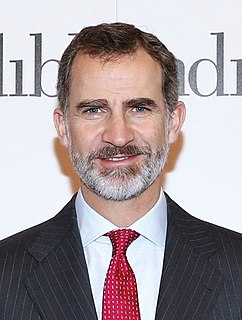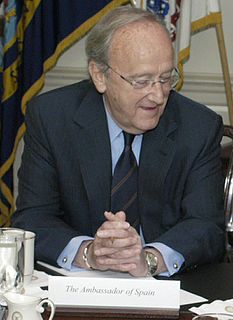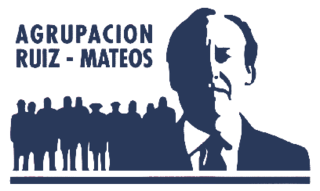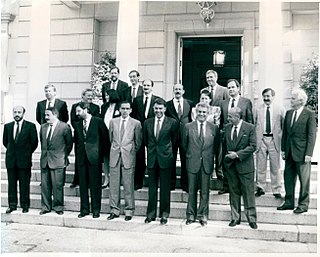
Felipe VI or Philip VI is the King of Spain. He ascended the throne on 19 June 2014 upon the abdication of his father, King Juan Carlos I. His mother is Queen Sofía, and he has two older sisters, Infanta Elena, Duchess of Lugo, and Infanta Cristina. In 2004, Felipe married TV news journalist Letizia Ortiz with whom he has two daughters, Leonor and Sofía.

Felipe González Márquez is a Spanish lawyer, professor, and politician, who was the Secretary-General of the Spanish Socialist Workers' Party (PSOE) from 1974 to 1997, and the 3rd Prime Minister of Spain since the restoration of democracy, from 1982 to 1996. To date, he remains the longest-serving Prime Minister of Spain to be freely elected.

The 1996 Spanish general election was held on Sunday, 3 March 1996, to elect the 6th Cortes Generales of the Kingdom of Spain. All 350 seats in the Congress of Deputies were up for election, as well as 208 of 257 seats in the Senate.

The 1993 Spanish general election was held on Sunday, 6 June 1993, to elect the 5th Cortes Generales of the Kingdom of Spain. All 350 seats in the Congress of Deputies were up for election, as well as 208 of 256 seats in the Senate.

Manuel Chaves González is a Spanish politician of the Spanish Socialist Workers' Party (PSOE). Since 2009 he has served as the Third Vice President of the Spanish Government, until 2011, and between 2000 and 2012 as the Chairman of PSOE. From 1990 to 2009 he was the President of the Regional Government of Andalusia. He is a trustee of the Fundacion IDEAS, Spain's Socialist Party's think tank. On 17 February 2015, together with former President of Andalusia, José Antonio Griñán, was implicated in the ERE case, a huge corruption scandal in the region.

The 1989 Spanish general election was held on Sunday, 29 October 1989, to elect the 4th Cortes Generales of the Kingdom of Spain. All 350 seats in the Congress of Deputies were up for election, as well as 208 of 254 seats in the Senate. An election had not been due until 28 July 1990 at latest, but Prime Minister Felipe González called for a snap election nine months ahead of schedule, allegedly on the need of implementing tough economic measures. González hoped to capitalize on a still strong economy and his party's electoral success in a European Parliament election held in June, after a troubled legislature which had seen an increase of social protest on his government's economic policy and the calling of a massive general strike in 1988.

The 1986 Spanish general election was held on Sunday, 22 June 1986, to elect the 3rd Cortes Generales of the Kingdom of Spain. All 350 seats in the Congress of Deputies were up for election, as well as 208 of 254 seats in the Senate.

Ernest Lluch Martín, was a Spanish economist and politician from Catalonia. He was Minister of Health and Consumption from 1982–1986 in the first post-Francisco Franco Spanish Socialist Workers' Party (PSOE) government of Felipe González. He was assassinated in 2000 by the Basque terrorist organisation, ETA.

Carlos Westendorp y Cabeza is a Spanish diplomat and former Secretary General of the Club of Madrid.

Real Madrid Baloncesto is a Spanish professional basketball team that was founded in 1931, as a division of the Real Madrid CF multi sports club. They play domestically in the Liga ACB, and internationally in the EuroLeague.
Enrique Sarasola Lerchundi was a Spanish industrialist, a major figure in his country's transition to democracy, and an owner and breeder of Thoroughbred racehorses.

The 1989 European Parliament election in Spain was held on Thursday, 15 June 1989, as part of the EU-wide election to elect the 3rd European Parliament. All 60 seats allocated to Spain as per the 1985 Treaty of Accession were up for election.

Jerónimo Saavedra Acevedo is a Spanish politician. He served as President of the Canary Islands twice from 1982 to 1987, and again from 1991 to 1993.

Francisco Fernández Marugán is a Spanish economist and politician for the Spanish Socialist Workers' Party (PSOE) and a long serving member of the Spanish Congress.

Jordi Solé Tura was a Spanish politician, jurist and one of the co-authors and "Fathers" of the Spanish Constitution of 1978 following Spain's move to democracy.

The Party of Labor and Employment–Ruiz-Mateos Group, better known as Ruiz-Mateos Group, was a Spanish political party founded by businessman José María Ruiz-Mateos following the expropriation of the Rumasa holding company. It was enrolled in the register of political parties with the Spanish Ministry of the Interior on August 30, 1989.

Felipe González formed the González I Government on 3 December 1982 after being nominated by King Juan Carlos I to form a government as a result of the Spanish Socialist Workers' Party (PSOE)'s victory at the 1982 general election. It was the government of Spain from 3 December 1982 to 26 July 1986, a total of 1,331 days, or 3 years, 7 months and 23 days. González was elected Prime Minister by the Congress of Deputies on 1 December and was sworn into office on 2 December. González's first cabinet was composed mainly by members of the PSOE and its sister party, the Socialists' Party of Catalonia (PSC). It succeeded the Calvo-Sotelo government.

Felipe González formed the González II Government on 26 July 1986 after being nominated by King Juan Carlos I to form a government as a result of the Spanish Socialist Workers' Party (PSOE)'s victory at the 1986 general election. It was the government of Spain from 26 July 1986 to 7 December 1989, a total of 1,230 days, or 3 years, 4 months and 11 days. González was elected Prime Minister by the Congress of Deputies on 23 July and was sworn into office on 24 July. González's second cabinet was composed mainly by members of the PSOE and its sister party, the Socialists' Party of Catalonia (PSC), as well as a number of independents. It succeeded the first González government.

Felipe González formed the González III Government on 7 December 1989 after being nominated by King Juan Carlos I to form a government for a third term in office as a result of the Spanish Socialist Workers' Party (PSOE)'s victory at the 1989 general election. It was the government of Spain from 7 December 1989 to 14 July 1993, a total of 1,315 days, or 3 years, 7 months and 7 days. González was elected Prime Minister by the Congress of Deputies on 5 December 1989 and was sworn into office on 6 December. González's third cabinet was composed mainly by members of the PSOE and its sister party, the Socialists' Party of Catalonia (PSC), as well as one independent. It succeeded the second González government.

Felipe González formed the González IV Government on 14 July 1993 after being nominated by King Juan Carlos I to form a government for a fourth term in office as a result of the Spanish Socialist Workers' Party (PSOE)'s victory at the 1993 general election. It was the government of Spain from 14 July 1993 to 6 May 1996, a total of 1,027 days, or 2 years, 9 months and 22 days. González was elected Prime Minister by the Congress of Deputies on 9 July and was sworn into office on 13 July. González's fourth cabinet was composed mainly by members of the PSOE and its sister party, the Socialists' Party of Catalonia (PSC), as well as a number of independents. It succeeded the third González government.


















